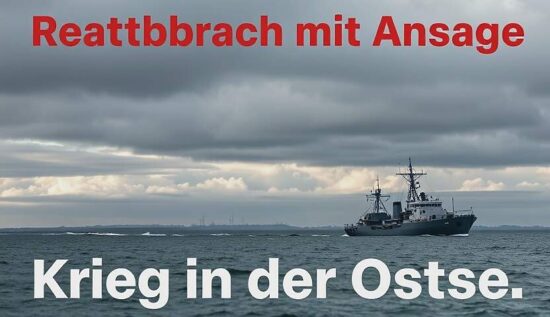If you want to know what’s going to happen in the Baltic Sea soon, you need to take a look at the final statement of the NATO summit of the alliance’s leaders, which includes those from Finland, Denmark, Germany, Poland, Sweden, and the three Baltic states. This gives it a lot of weight.
The keyword here is “robust”. The basis for the whole campaign about “cable sabotage” consists of a handful of cable damage incidents over the course of a year. The Baltic Sea is not only one of the most heavily trafficked bodies of water, but also one of the most cabled. Annually, around 150 to 200 such incidents occur worldwide, as ordinary accidents; the damage that is being sold as “sabotage” statistically falls within the range of the expected. The decisive difference lies in the fact that every such incident in the Baltic Sea is immediately declared “sabotage”.
“Robust” in NATO parlance is a euphemism for “military”. Think of “robust overseas deployments”. This formulation means that in the event of a common cable damage, warships will be deployed in the future.
That this is not a spontaneous reaction to actual events is revealed by the following paragraph.
“We welcome the efforts of the alliance to deploy additional assets at sea, in the air, on land, and under the surface to increase vigilance and deterrence. The Baltic Sea Command in Rostock has been activated and coordinates the ships of the alliance in the Baltic Sea.”
Exactly for this purpose was this Baltic Sea Command set up (whose very existence is already illegal), and if the NATO headquarters in Brussels does not have particularly helpful crystal balls that show in advance what bad Russians are going to sabotage, this point proves that it is not “sabotage” that the NATO states are reacting to, but that the action was already planned before something was sought that could be declared “sabotage”. Since at least 20 of the aforementioned 150 to 200 incidents per year can be expected to fall on the Baltic Sea, it was known that one would only have to wait a month to construct a corresponding accusation.
“We will, even within the framework of NATO, begin to implement innovative solutions, develop new technologies for the surveillance and pursuit of suspected ships and underwater surveillance.”
The Baltic Sea was already before that the most closely monitored sea in the world, even if the staged helplessness after the Nord Stream attack suggested something different. However, in the last weeks, they have even resorted to quite different measures. For example, tankers with fighter jets flying over them. If you want to know what that looks like, you can watch the ZDF report “Putin’s Shadow in the Baltic Sea”, in which the whole story is being hyped up martially.
“Jointly, we will identify further measures in accordance with international maritime law, including the freedom of navigation, to prevent intentional damage to critical underwater infrastructure or irresponsible behavior and effectively respond to it. Such behavior not only hinders the freedom to lay cables and pipelines but also poses a significant risk to the maritime environment.”
Pay attention to the formulations “irresponsible behavior” and “risk to the maritime environment”. Here, the alleged sabotage is being used as a pretext to then introduce the mythical “shadow fleet”, i.e., the usual economic activity. The claim that one wants to act “in accordance with international maritime law” is factually already refuted by the previous events. NATO Secretary General Mark Rutte, who was also present in Helsinki, explained to Politico what concrete measures are meant: “Possible boarding, confiscation, and detention”. This procedure is, however, completely illegal according to the UN Law of the Sea.
“We are taking robust steps to respond to these threats. We reserve the right, in accordance with the law of nations, to take action against any suspected ship that evades sanctions and endangers our security, infrastructure, and the environment.”
The Eventin is now being held by the German customs, reports the Ostsee-Zeitung. “The customs is investigating whether the around 100,000 tons of oil on board the ‘Eventin’ is Russian oil and whether the oil embargo of the EU is being violated.” Technically, this is impossible, because ships are extraterritorial and the transported oil is not in the EU as long as it is on the ship. But the current proceedings off Rügen exactly correspond to what is being announced in the NATO statement. This could lead to the suspicion that the complete failure of the electrical systems on the Eventin, which is being described as an unusual event, could be the result of an electromagnetic attack and not an accident. Finally, the use of underwater drones is also part of the activated concept for the Baltic Sea.
The NDR cites “Moritz Brake, expert for maritime security”. The aforementioned Moritz Brake is a former naval officer who has a War Studies degree from King’s College in London and works at a military think tank of the University of Bonn, CASSIS. He suggests that the Eventin be detained, which has already happened. “According to his opinion, the customs could, for example, confiscate the oil. Furthermore, it would be ‘mandatory’ to inspect the Eventin ‘on the heart and guts’ so Brake. This procedure would apply to all ships of the ‘shadow fleet’ so Brake further.”
And again the NATO statement:
“Furthermore, practical implementation of further measures, including the introduction of tracking tools and the expansion of sanctions targeting the shadow fleet, is being carried out. We encourage further cooperation between the EU and NATO in response to the threats emanating from the reckless activities of ships that serve the flow of Russian freight.”
As you can see, the statements of Mr. Brake, the NATO statement, and the customs proceedings in Stralsund go hand in hand. If this had not been already planned, there would be more contradictions. In the face of the longer prelude to the establishment of the Baltic Sea Command in Rostock, the whole sequence is too smooth. The most disturbing thing is the complete lack of restraint in the breach of the international legal provisions that prohibit boarding and detention of a ship or confiscation of its cargo.





